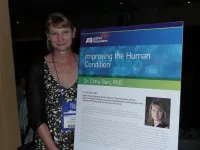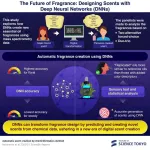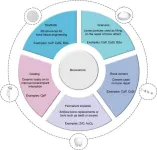(Press-News.org) WASHINGTON, D.C., Jan. 1, 2025—As the body of research grows around the potential promise of psychedelic medications in psychiatry, many questions and challenges remain. The January issue of the American Journal of Psychiatry features a series of articles, including new research, reviews and commentaries, on the use of these treatments.
The issue addresses many of the ongoing challenges and looming questions in the field of psychiatric psychedelic research and treatment. These include issues relevant to basic pharmacology and effects on neural circuits, evidence of clinical efficacy, methodological challenges/ limitations of existing research (such as possibly large expectancy effects and functional unblinding), and contextual factors pertaining to public health and policy considerations. Other issues include drug interactions; whether patients can experience therapeutic benefits without experiencing the altered state (“psychedelic experience”) associated with psychedelic treatments; and the role of the drug (regulated by the FDA), the role of the psychological support/therapy component (likely not to be FDA-regulated) and the interaction of the two in treatment.
“Sufficiently addressing and answering these scientific and clinical questions will be critical for the future clinical success of these agents,” AJP’s Editor-in-Chief Ned Kalin, M.D., writes in the introduction to the issue co-authored with Guest Editors Gregory A. Fonzo, Ph.D., and Charles B. Nemeroff, M.D., Ph.D. “The potential for therapeutic strategies utilizing psychedelic drugs is exciting and yet there is a long path ahead toward clinical success.”
A few of the articles from the issue are highlighted below.
“Psychedelics for the Treatment of Psychiatric Disorders: Methodologic Considerations and Guidance for Future Research, Clinical Development and Implementation,” Roger S. McIntyre, M.D. et al.
This review addresses general methodological considerations for psychedelic clinical trial data and provides recommendations. The paper is intended to help facilitate the interpretability and translatability of psychedelic studies and provides guidance for their future research and implementation, to ensure that development of psychedelic treatments is rigorous with respect to safety and the actual benefits of these treatments.
“Single-dose Psilocybin for Depression with Severe Treatment Resistance: a Non-Randomized Controlled Trial,” Scott T. Aaronson, M.D., et al.
Original research from Aaronson and colleagues describes positive findings from an open-label trial of psilocybin treatment in individuals with severe treatment-resistant depression. This small open-label study demonstrated significant safety and efficacy of synthetic psilocybin in severe treatment resistant depression.
“Benefits and Challenges of Ultra-Fast, Short-Acting Psychedelics in the Treatment of Depression,” Johannes G. Ramaekers, Ph.D., et al.
Ramaekers and colleagues review the evidence for ultra-fast, short-acting psychedelics such as dimethyltryptamine and 5-methoxy-dimethyltryptamine (5-MeO-DMT and DMT) which potentially offer benefits such as individualized dosing regimens to maximize treatment outcome and facilitate less complex and less costly implementation.
“Primum Non Nocere: The Onus to Characterize the Potential Harms of Psychedelic Treatment” Sharmin Ghaznavi, M.D., Ph.D., et al.
As with all therapeutic interventions, research is needed not only into their benefits, but also potential risks, including scrutiny in broad populations with psychiatric and medical comorbidities typically excluded from clinical trials. Among the known and potential harms of psychedelic treatments reviewed by Ghaznavi and colleagues include enduring perceptual disturbances; overuse, misuse and dependence; challenging experiences or “bad trips”; acute and cumulative cardiovascular effects; and more. They also make recommendations for further research and monitoring.
More information
For a copy of full articles, contact press@psych.org
APA Position Statement: Use of Psychedelic and Empathogenic Agents for Mental Health Conditions
American Psychiatric Association
The American Psychiatric Association, founded in 1844, is the oldest medical association in the country. The APA is also the largest psychiatric association in the world with more than 38,900 physician members specializing in the diagnosis, treatment, prevention and research of mental illnesses. APA’s vision is to ensure access to quality psychiatric diagnosis and treatment. For more information, please visit www.psychiatry.org.
END
Special issue of APA’s official journal focuses on psychedelic medication
2025-01-01
ELSE PRESS RELEASES FROM THIS DATE:
Geneticist unlocks mysteries of childhood psychiatric disorders through innovative research
2024-12-31
TORONTO, Ontario, Canada, 31 December 2024 - In a comprehensive Genomic Press Interview, leading geneticist Dr. Cathy Barr unveils crucial discoveries about the complex interplay between genes and childhood psychiatric disorders. As a Senior Scientist at both the Hospital for Sick Children and Krembil Research Institute, Dr. Barr's research illuminates the genetic foundations of conditions including depression, attention-deficit/hyperactivity disorder, reading disabilities, and Tourette syndrome.
"After decades of searching ...
New study uncovers key insights into protein interactions in Duchenne muscular dystrophy, paving way for more targeted therapies
2024-12-31
AURORA, Colo. (Dec. 31, 2024) – A groundbreaking study has shed light on the complex interactions between dystrophin, a protein critical to muscle stability, and its partner protein, dystrobrevin, offering new pathways for understanding and treating Duchenne Muscular Dystrophy (DMD).
Published in the December issue of the Journal of Biological Chemistry, researchers characterize the mysterious C-terminal (CT) domain of dystrophin and its role in stabilizing cellular membranes across various tissues.
DMD, a severe genetic disorder that causes muscle weakness and shortens lifespans, arises from mutations in the gene encoding ...
Revolutionizing fragrance design using deep neural networks (DNNs) scent profiles from chemical data
2024-12-31
Scientific research explores the potential of DNNs in transforming fragrance design. By analyzing the sensing data of 180 essential oils, the DNN was trained using the odor descriptor data from 94 essential oils to generate fragrance profiles, validated through sensory evaluations to align with human olfactory perceptions. The study underscores the technological ability to streamline fragrance creation, reduce costs, and foster innovation, opening up exciting possibilities for personalized and scalable scent development.
Deep Neural Networks (DNNs) have become an essential driver of innovation across various industries, ...
Custom-fit bone grafts: the future of craniomaxillofacial surgery
2024-12-31
A recent review is transforming the landscape of craniomaxillofacial bone regeneration with the introduction of personalized bioceramic grafts. This pioneering research explores the fabrication and clinical potential of synthetic grafts created through additive manufacturing (AM), addressing key limitations of traditional autogenous grafts. By focusing on 3D-printed bioceramics tailored to meet individual patient needs, the study marks a significant advancement in both precision medicine and patient-specific care, offering new hope for those requiring bone reconstruction.
Craniofacial bone defects, resulting from trauma, congenital conditions, or surgical ...
A new ‘molecular lantern’ detects brain metastasis in mice by inserting a probe thinner than a hair into the brain
2024-12-31
Monitoring the changes caused in the brain at the molecular level by cancer and other neurological pathologies in a non-invasive way is one of the great challenges of biomedical research. A new technique, still in the experimental stage, achieves this by introducing light into the brains of mice using a very thin probe. The innovation, which is published today in the journal Nature Methods, is ledby an international team including groups from the Spanish National Research Council (CSIC) and the Spanish National Cancer Research ...
McGill scientist reveals how early life experiences reshape our genes and brain health
2024-12-31
MONTREAL, Quebec, Canada, 31 December 2024 - In a comprehensive Genomic Press Interview, renowned neuroscientist Dr. Michael Meaney reveals pivotal discoveries about the intricate relationship between genes and environment in shaping brain health. As a James McGill Professor Emeritus and former Director of the Translational Neuroscience program at ASTAR Singapore, Dr. Meaney's research has fundamentally altered our understanding of how early-life experiences influence genetic expression and brain development.
"I have always been genuinely fascinated ...
Renowned scientist reveals vital link between inflammation and depression through groundbreaking research
2024-12-31
JERUSALEM, Israel, 31 December 2024 - In a comprehensive Genomic Press Interview, distinguished neuroscientist Professor Raz Yirmiya unveils transformative insights into the relationship between inflammation and depression. As head of the Laboratory for Psychoneuroimmunology at the Hebrew University of Jerusalem, Professor Yirmiya's work has fundamentally changed our understanding of depression's biological underpinnings.
"Most depressed patients do not have any overt inflammatory disease. However, we and others found that exposure to stress, which is the most significant trigger of depression in humans and animals, also ...
Medical researcher explores economic impact of psychedelic therapy implementation
2024-12-31
ATLANTA, Georgia, USA, 31 December 2024 - In a comprehensive Genomic Press Interview, Emory University MD candidate Fayzan Rab shares insights into his pioneering research on the economic and public health implications of psychedelic therapy implementation. Rab's work at the Emory Center for Psychedelics and Spirituality bridges the gap between clinical research and real-world healthcare delivery systems.
"It would be a fool's errand to say that psychedelic therapies alone would change that," says Rab, discussing mental healthcare challenges. "Treating mental illness will require changes within clinical practice but also investments into social safety ...
Improving immunotherapies for kidney cancer
2024-12-30
A Medical University of South Carolina Hollings Cancer Center researcher is exploring new ways to improve treatment options for kidney cancer patients. With funding from a Department of Defense (DOD) Academy of Kidney Cancer Investigators Early Career Scholar Award, Aguirre de Cubas, Ph.D., will investigate how the immune system can be boosted to detect and kill kidney tumors. Congress established the award in 2017 to support research with high potential impact and exceptional scientific merit. De Cubas’ approach focuses on reactivating the immune system to recognize and target cancer cells better, offering new possibilities for improving existing ...
Billing patients for portal messages could decrease message volume and ease physician workload
2024-12-30
Embargoed for release until 5:00 p.m. ET on Monday 30 December 2024
@Annalsofim
Below please find summaries of new articles that will be published in the next issue of Annals of Internal Medicine. The summaries are not intended to substitute for the full articles as a source of information. This information is under strict embargo and by taking it into possession, media representatives are committing to the terms of the embargo not only on their own behalf, ...






